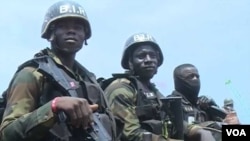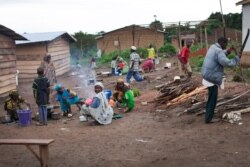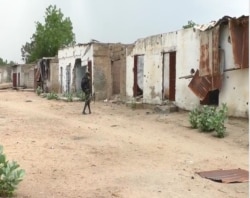Cameroon is dispatching more than a thousand troops to help bring peace to its troubled neighbor, the Central African Republic. The troops are leaving as analysts say they are already stretched handling such internal crises as piracy in the Gulf of Guinea, the Boko Haram insurgency and the separatist crisis that has left at least 3,000 killed in three years.
The Cameroon military band plays as the first contingent of over 300 peacekeeping troops leaves for the neighboring Central African Republic on September 4. Cameroon's defense minister, Joseph Beti Assomo, said they have been well trained to join the U.N. peacekeeping mission of more than 13,000 troops, police and civilians to restore peace to the Central African Republic while respecting the rights and dignity of the people they are protecting.
"Always determined to fulfill his regional and international commitment as concerns collective security, the head of state, commander in chief of the armed forces has provided the Central African Republic with multifaceted support in order to enable the country to get its institutions which have already been damaged back on the feet," he said.
Beti Assomo said Cameroon was deploying 1,300 troops and civilians who, by protecting the Central African Republic, will also be protecting Cameroon. Cameroon hosts about 250,000 CAR refugees, and rebels quite often cross over and hold Cameroonian farmers and cattle ranchers for ransom. They also hide across the porous border with Cameroon when challenged in the Central African Republic
The crisis began in the troubled country in 2013, when a mainly Muslim rebel movement called the Seleka overthrew President Francois Bozize, a Christian. That move triggered the rise of a predominantly Christian militia called the Anti-Balaka. Thousands have been killed and a quarter of the population of 4.5 million have fled their homes.
Counting on international help
CAR Ambassador to Cameroon Marcial Beti Marace said his country has been counting on the international community to help it out of the crisis.
He said the people and president of CAR are proud to know that they will have support to bring back badly needed peace and order to their country from well-trained Cameroonian peacekeepers.
Donatien Tchega, a visiting lecturer at the University of Yaounde, said the decision to dispatch Cameroon troops to the neighboring state may seriously undermine efforts to secure its own territory and the Gulf of Guinea, where there are regular reports of pirate attacks.
He said it is not a good decision for Cameroon, which is already facing enormous challenges fighting Boko Haram terrorists on its northern border with Nigeria, containing the spillover of the crisis in CAR with sporadic rebel attacks on its territory, and especially stopping separatists from their fight to create an English-speaking state, to send over a thousand of its troops to a foreign country.
He said the Cameroonian military is overstretched and this decision may also hamper its effort to fight piracy in the Gulf of Guinea, separatists in the English-speaking regions, and Boko Haram terrorists.
Cameroon, however, said it must contribute to bring peace and order in the Central African Economic and Monetary Community, of which the Central African Republic, Chad, Equatorial Guinea, Gabon and the Republic of the Congo are also members. Cameroon has over 24 million of the 54 million people in the economic bloc.






